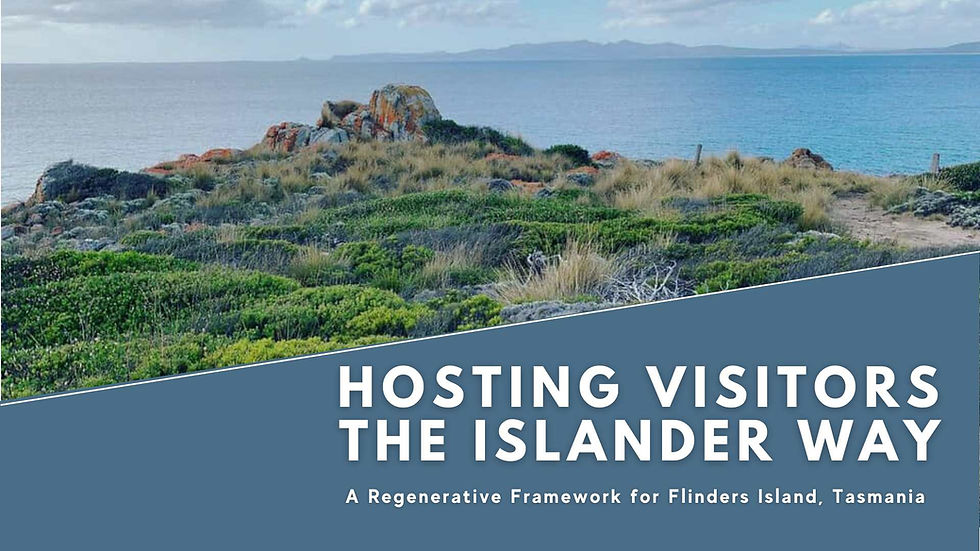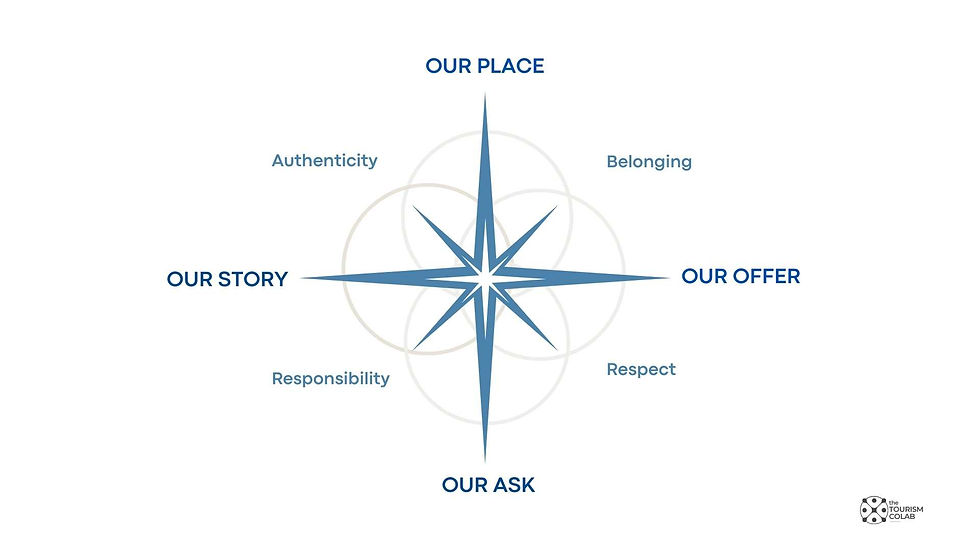A Regenerative Tourism Framework for Flinders Island

This week we hit a milestone. It's an ending in one sense and a new beginning. Flinders Council adopted the "Hosting Visitors the Islander Way Regenerative Framework'. It has been a privilege to have worked with the community on Flinders Island to develop a different approach to tourism and the visitor economy. It is an approach that brings community, as equal partners, into the conversation and asks ‘How we can host visitors who respect and care for place?’
The final framework was presented to and approved by Council as an advocacy document and a pathway for the future of hosting visitors on the island that will be supported by the community. It serves as a roadmap to cultivate a regenerative style of tourism. The stage is now set for the community to guide the way forward in collaboration with those businesses and government agencies willing to work with and honour the regenerative approach outlined as a result of extensive community engagement.
About the Islander Way Regenerative Tourism Project
The 'Islander Way' has been a two-year 'living lab' project funded by the Tasmanian Government and supported by the Flinders Council and Visit Northern Tasmania. The project commenced in the latter part of 2021, and while funding was completed in July 2023, it has created considerable momentum across an ecosystem of 'careholders' interested in the future of Flinders Island. Significant in-roads have been made in building a shared understanding of hosting for positive impact, and working together to build a new relationship with tourism. Now it's time for the community to take leadership.
The Islander Way project was funded by the Tasmanian Government and supported by both Flinders Council and Visit Northern Tasmania. The community has generously contributed over 1,000 hours of their collective time to this initiative. Starting with the question "What do we need to flourish so that we may host the kinds of visitors we would like to welcome?' the journey has unfolded as a result of the community's sense of care and stewardship, but also the incredible lived experience and local knowledge they were willing to share.
Project Inception
Born out of rising concerns about tourism during the COVID-19 pandemic, the Islander Way project addressed the influx of a new type of visitor to the Island that had been sold a promise that was not deliverable and not aligned with the Islander Way. This surge impacted local lifestyles and raised questions about environmental stewardship. It also highlighted a range of factors that had contributed to perceptions of overtourism. It also raised issue with the existing governance arrangements where tourism was being done to the community yet the existing governance structure did not give community a voice in decisions that affect them. While tourism triggered the project, it soon became apparent that the community had other, broader concerns relating to resilience. These included waste management, food security, housing, and the implications of an ageing population on the Island.
With limited infrastructure and resources, questions emerged about how tourism could be a part of the Island's future, particularly if underlying issues related to resilience and sustainability were not addressed. In response, the Islander Way's “Ideas Incubator” guided the Community to focus on six key sub projects. The resulting Framework identifies 6 community-led projects and 20 additional action points, underscoring the community's ongoing commitment and desire to host visitors the Islander Way. The journey centred on four points:
What is our place? (Our values, what makes us belong and what makes us care and willingly take stewardship of these Islands)
What is our story? (Based on Brand Tasmania's incredible Islander Way story)
What do we want to offer? (What can we genuinely offer with an open heart, as opposed to what others promise)
What can we ask of our visitors, the policy-makers who make decisions about us, and the the businesses that extract value from our place, our community, and nature?

Honouring the community
The Regenerative Framework is a clarion call for a different approach to the visitor economy - one where community has a voice and where visitors come into a relationship with the Island, the community and nature. It's a call for policy makers from away to respect the community, and it offers proof that there is a better approach to genuine, responsible and respectful hosting of visitors. It is not anti-tourism but captures the ethos of the The Islander Way story:
Learn to be one of us for a few days, a week, or the rest of your life. Slow down, get lost, co-contribute, connect..... Don’t try to change this place. Let this place change you.
Some 1000+ community hours have been invested in the project. The Framework itself was co-designed and co-written with the community. Among the highlights on this journey are:
An extensive community engagement exercise which sought to acknowledge, listen, respect and heal.
A community led ideas incubator.
Co-design and coaching to facilitate individual actions.
A podcast series Latitude 40 Redesigning Tourism on a Small Island that sought to tell the stories of the islanders, and which we hope will be continued.
A community-led event, The Furneaux Futures Forum, which brought together new ideas and opportunities to foster creativity and innovation in the business, social, and environmental spheres for the Furneaux Islands Community. In this forum, 10 locals shard their stories of regeneration, belonging and love of place.
A community of practice that supports individuals and networks within the community to share inspiration, conversations and ideas.
What happens next?
This Framework is the beginning of a new phase. On the ground, the Islander Way will continue to unfold. There are plans and actions afoot - many more than the Framework was able to document. That is what happens when a community is activated, takes a journey, and opens hearts and minds, perspectives and confidence. It is an emerging process, self-organised, and activated out of love, belonging, and stewardship of place. While we took all steps possible to open and engage hearts and minds, we understand that not everyone was ready at the same time for this journey.
However, over time we are confident that 'regeneration' will become the common ground. Afterall, regenerative tourism seeks to ensure visitor experiences, travel and tourism deliver a net positive benefit to people, places and nature, and that it supports the long-term renewal and flourishing of our social and ecological systems. Who can argue against that?
In order to honour the community's work, to progress the six community-led projects and 20 initiatives, the next steps could include:
Establishing a community collective to represent the voice of community and support the implementation of the framework
Support the 6 community-led projects
A community-led activation program
A business activation program to support the Island's regenerative values
Working outside the system
This framework represents the beginning of the next part of the journey. We have have all learned much and gathered incredible insights. On the ground, the Islander Way will continue to unfold. This project has shown how to activate social licence and involve the community in constructive ways when they have a purpose in common. Like any change-making journey however, not everyone was ready at the same time for this journey. But it is clear that once regeneration is understood, it is not possible to look away:
A regenerative approach seeks to ensure that travel and visitor experiences support the long-term renewal and flourishing of our social and ecological systems. When we have a flourishing community and we care for country and waters, the local economy can thrive. Who can argue against that?
Read the framework at the link below, or go to the website for more information and reflections www.islanderway.co


Comments